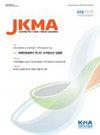Problems and improvements in the Medical Law’s excessive regulation of physicians in Korea
IF 0.5
Q3 MEDICINE, GENERAL & INTERNAL
引用次数: 0
Abstract
Background: The Medical Service Act was implemented to protect the public’s health, but has come to excessively restrict the fundamental rights of medical professionals. Therefore, it is necessary to systematically organize the level of physicians’ obligations and the sanction provisions present under the Medical Law.Current Concepts: The Medical Law consists of 120 articles, 6 of which address physicians’ rights. However, the law also provides 72 reasons for physicians’ obligations and penalties, 40 reasons for the suspension of qualifications, 20 reasons for administrative fines, 30 reasons for corrective orders, and 17 reasons for the revocation of permission for establishment. Thus, the Medical Law provides medical professionals with approximately 150 reasons for obligations and sanctions.Discussion and Conclusion: We would like to suggest some measures to improve the excessive regulation of physicians under the Medical Law. First, statistics on the status of penalties and administrative dispositions must be accumulated and disclosed; second, obligations, penalties, and administrative dispositions must be stipulated in one consolidated article; third, penalties should be avoided for simple violations of duty; fourth, reasons for administrative dispositions–such as enforcement ordinances of the Medical Law–must be elevated to the Medical Law itself; fifth, the authority for administrative dispositions against medical institutions must be unified under the Minister of Health and Welfare, the subject of duties and responsibilities must be clarified as the ‘establisher of a medical institution,’ rather than a ‘medical institution,’ and the adequate time required for when two types of administrative dispositions are made must be unified; and sixth, detailed information on the administrative disposition procedures must be newly established in the Medical Law.韩国《医疗法》对医生过度监管的问题与改进
背景:医疗服务法》的实施旨在保护公众健康,但却过度限制了医务人员的基本权利。因此,有必要对《医疗法》中规定的医生义务和制裁条款进行系统梳理:医疗法》共 120 条,其中 6 条涉及医生的权利。然而,该法还规定了 72 项医师义务和处罚理由,40 项暂停执业资格理由,20 项行政罚款理由,30 项责令改正理由,17 项撤销开业许可理由。因此,《医疗法》为医疗专业人员提供了约 150 条义务和处罚理由:我们希望提出一些措施来改善《医疗法》对医生的过度监管。第一,对处罚和行政处罚的情况进行统计和公开;第二,将义务、处罚和行政处罚统一规定在一个条款中;第三,避免对简单的违规行为进行处罚;第四,将行政处罚的理由--如《医疗法》的执行条例--上升到《医疗法》本身;第五,将对医疗机构的行政处罚权统一归属于厚生劳动大臣,将职责主体明确为 "医疗机构的设立者 "而非 "医疗机构",统一两类行政处罚的充分时间要求;第六,在《医疗法》中新增行政处罚程序的详细信息。
本文章由计算机程序翻译,如有差异,请以英文原文为准。
求助全文
约1分钟内获得全文
求助全文
来源期刊

Journal of The Korean Medical Association
Medicine-General Medicine
CiteScore
0.50
自引率
0.00%
发文量
84
审稿时长
4-8 weeks
期刊介绍:
The Journal of the Korean Medical Association (JKMA) is the official peer-reviewed, open-access, monthly journal of the Korean Medical Association (KMA). It contains articles in Korean or English. Its abbreviated title is ''J Korean Med Assoc''. The aims of the Journal include contributing to the treatment of and preventing diseases of public health importance and to improvement of health and quality of life through sharing the state-of the-art scientific information on medicine by the members of KMA and other national and international societies.
 求助内容:
求助内容: 应助结果提醒方式:
应助结果提醒方式:


